The first screening of the 19th Travelling Docudays UA in Lviv Oblast: Tales of a Toy Horse, nature at war and the ability to look for the good in every day
The first screening of the 19th Travelling Docudays UA in Lviv Oblast: Tales of a Toy Horse, nature at war and the ability to look for the good in every day
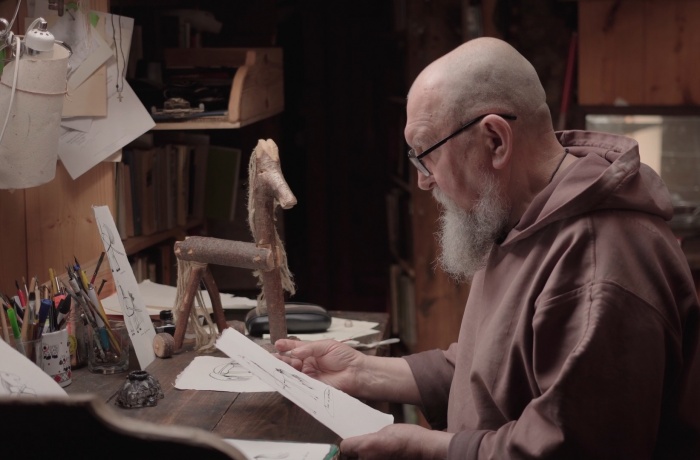
Tales of a Toy Horse is a film about how a monk and a toy horse travelled to the East, taught those around them to see the good in every day, create homemade paper using mediaeval monastic technology and collect good stories, say the authors of the film, Ulyana Osovska, Denis Strashny. The film screening was held on 12 November at Center for Urban History of East Central Europe in Lviv. The conversation was moderated by Nina Khoma, the Travelling Docudays UA coordinator in Lviv Oblast.
The bright hall of the Center for Urban History Center was slowly filled with people. Neat rows of yellow and black chairs, a flat canvas of the screen, a white eye of the projector under the ceiling, the cosy noise of the coffee machine in the coffee shop in the next room. This atmosphere greeted more than thirty viewers who joined the opening of the Docudays UA Festival in Lviv Oblast.
At the beginning of the meeting, all those present stood up with white sheets of paper with one simple inscription: "Freedom to Maksym Butkevych." Maxym is a friend of the Docudays UA festival. A famous journalist and human rights defender, who volunteered to join the army immediately after the start of the full-scale invasion, was captured by the Russian military in Luhansk Oblast at the end of June. For many years in a row, Maksym Butkevych accompanied the human rights discussions at the Docudays UA International Human Rights Documentary Film Festival in Kyiv and participated as an expert on the protection of internally displaced persons' and asylum seekers' rights within the Travelling Festival in various regions of Ukraine. And now he himself needs help and protection – because his fate is still in the hands of the Russian occupiers.

Screening of the film Tales of a Toy Horse within the Travelling Docudays UA in Lviv. Photo: Dmytro Shatskyi
Similarly, the story of the volunteer, documented by the heroes of the meeting – directors Denis Strashny and Ulyana Osovska – is closely intertwined with the fate of the Ukrainian military and civilians suffering from the arbitrariness and war crimes of the Russians.
Tales of a Toy Horse is a documentary-animated story by Ulyana Osovska and Denis Strashny about the monk of the Norwegian Benedictine order, Anatoli Ljutjuk. He was born in Ternopil Oblast but has lived in an old Tallinn tenement for many years as a monk. Having made his monastic vows, Anatoli also gave a personal one to find something good in every day.
The beginning of the war in the East of Ukraine forces him, an artist, a monk, and a Ukrainian dissident, to leave the peaceful Estonian capital and go help the frontline towns. Keeping his promise, he also looks for good stories in the midst of war. And then, in the safety of his Tallinn tenement, Anatoli creates a handmade book from scraps of stories from the East of Ukraine, using the mediaeval monastic method of making paper. Anatoli has a company, a handmade wooden horse, which becomes the hero of tales about animals in war, written based on real events.
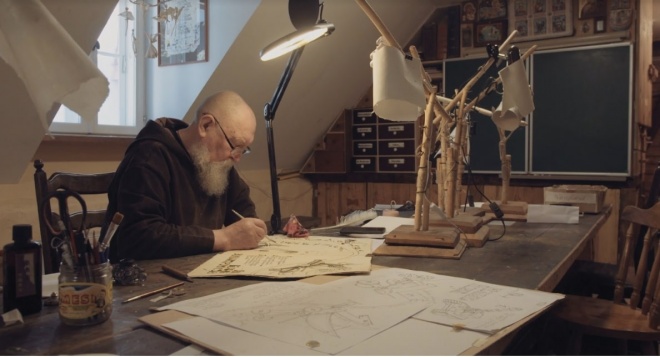
A still from the film Tales of a Toy Horse
"Our acquaintance with Anatoli is a story we never tire of telling. During the Maidan Revolution, I worked as a cameraman, documenting the events of the Revolution of Dignity. On 18 February, I came too close to the fighting on Instytutska Street and received a gunshot wound in the leg. Next two weeks I spent in the hospital," recalls Denis Strashny, director and chief cameraman of the film.
At the same time, the monk Anatoli Ljutjuk, together with the Ministry of Foreign Affairs of Estonia, organises a humanitarian mission to help those who suffered on the Maidan.
"I was one of the first to undergo rehabilitation in Estonia. There I met Anatoli. And he, in turn, invited Ulyana Osovska, my future wife, to his place in Tallinn. At that time, she was volunteering in Kyiv in the field of safe transportation of the wounded. That's how we met each other. Anatoli is the godfather of our family," says Denis.
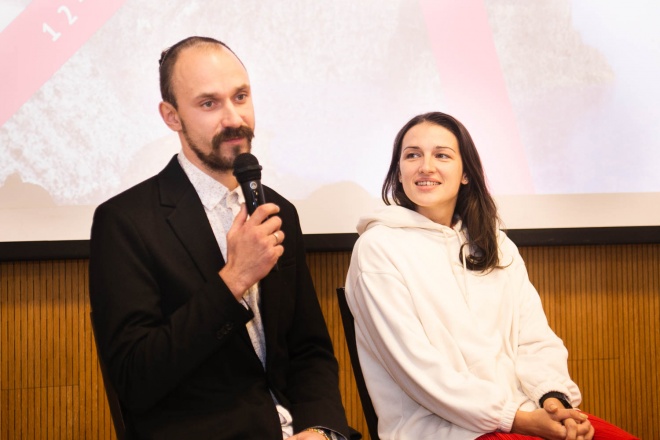
Screening of the film Tales of a Toy Horse within the Travelling Docudays UA in Lviv. Photo: Dmytro Shatskyi
Ulyana Osovska, co-director of the film, says that Ljutjuk is an activist with experience. An artist and later a monk, Anatoli emigrated to Estonia in the seventies of the twentieth century. He believed that without the independent Baltic countries, it would be difficult to restore the independence of Ukraine. And it will be much easier to collapse the USSR from Estonia.
Carta caritas, the rules of the monastery to which Anatoli belongs, involves the daily manual work, prayer, and reading of holy scriptures. And his personal promise is to find something good in every day. It helps train the brain to see positive things. Do not close yourself off from the world, but work for its well-being every day," says Osovska.
Since 2014, Anatoli has often travelled to Donbas with Estonian humanitarian and financial aid. The couple of Ukrainian directors have been accompanying him for the next six years, documenting the reality of the volunteer: distribution of food to internally displaced people, visiting wounded soldiers in the hospital, attempts to collect as many testimonies as possible about human beings and nature in war.
Ulyana recalls that in 2016 it was morally difficult for her to see how the frontline, slightly depressed Artemivsk (renamed to Bakhmut in the same year) lives.
"Then Anatoly told me, "I'm doing everything I can, that's why I'm not worried. I can't do more, that's why I don't worry." Now I also repeat these words to myself from time to time when things get difficult," says Osovska.
The couple of directors had been making a film about Ljutjuk for six years, creating and adding to the film's script during the work.
The couple says that it was Anatoli's idea to tell about the war through animal stories – he is in charge of a children's toy museum in Tallinn. It is much easier to translate the horrors and problems of martial law into children's language through the actions of cats, dogs, and a brave horse who comes to everyone's aid or receives it from others.
"Anatoly found these analogies in religion. He looked for interaction with animals in the lives of saints because this respect for nature grows out of Christian culture. People and war are always a search for sides, right and wrong. And animals do not choose sides. They simply suffer from human stupidity on their land. It was also important for Anatoli to talk about the lost relationship between humanity and nature, which is restored or manifested in extreme situations," says Ulyana.
Since 2014, the Ukrainian Cultural Center, founded by Anatoli Ljutjuk, has been implementing humanitarian projects supported by the Ministry of Foreign Affairs of Estonia and private sponsors. The centre takes care of internally displaced persons and victims who live in settlements near the frontline. People who need medical intervention are helped there with repeated operations and rehabilitation. The organisation also supported schools and children's institutions, helped with repairs, computer classes, and distribution of masks and disinfectants.
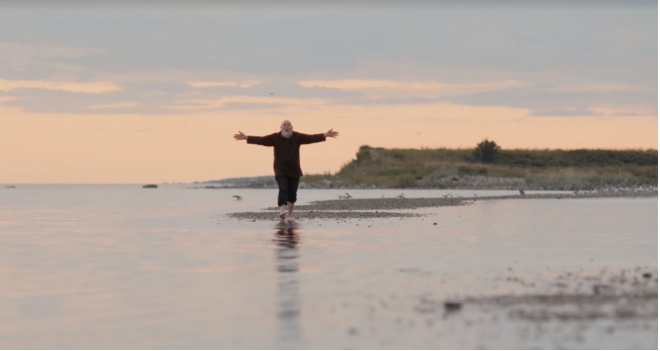
A still from the film Tales of a Toy Horse
According to the filmmakers, after the full-scale invasion, the Ukrainian Cultural Center in Tallinn contributed to the creation of Ukrainian classes in Estonian schools so that internally displaced children don't have to go to Russian schools. Also, the Center continues to provide assistance to Ukraine.
"It took a lot of time to make the film because we set ourselves the goal of making an animation documentary. We ran into scepticism, but in the end, we succeeded. At first, only we invested financially in the production, but then we were supported by the Ukrainian Cultural Foundation and the Estonian Film Institute," says Ulyana.
Anatoly actively collaborated with the animation director Rodion Shub. After Anatoli drew paws, legs, wings, and hooves for the characters, Rodion animated them for the documentary film.
The monk told Denis Strashny and Ulyana Osovska that each material has its own memory. Anatoli Ljutjuk collected wood, chandeliers, and small items for the construction of a church in Tallinn from old farms and even garbage dumps. For Anatoli, recycling and reuse became part of his daily philosophy. "That church is only 20 years old, but when you see it, it seems that it was built 200 years ago," laughs Ulyana.
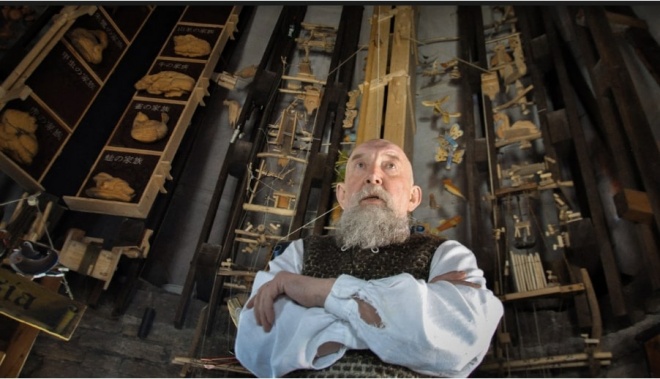
A still from the film Tales of a Toy Horse
The film by Ukrainian filmmakers documented how a monk makes handmade paper, weaving threads of Donbas into it, including herbs, pieces of military uniforms, children's drawings, photos, and scraps of advertisements. Then he creates a real book from these sheets.
"Whoever touches it can touch the war like that. And it can preserve our history in Estonia for many years. Thanks to this film, I got back to pre-war Mariupol. Even then, it was the border with Mordor. They thanked us then, saying how good it is that this film shows people what zone we live in," Ulyana recalls.
The film toured Ukraine and Estonia, was screened in Bulgaria, the Czech Republic, Poland, Romania, and the United Kingdom, and won an award at the FICMEC Environmental Film Festival in Spain.
"In Estonia, there was a Tales of a Toy Horse screening at the Pärnu Film Festival, one of the oldest ethnographic film festivals. Within the framework of the festival, films are also broadcasted on television, during which a national vote takes place. We received the "Estonian People's Award" as a result of this vote. It was very pleasant," recalls the director Ulyana Osovska.
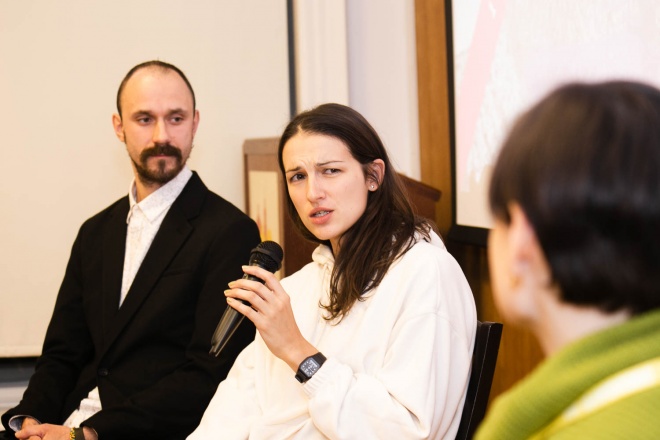
Screening of the film Tales of a Toy Horse within the Travelling Docudays UA in Lviv. Photo: Dmytro Shatskyi
After the start of a full-scale war, Ulyana once again visited Estonia with this film. The director says that for Estonians, Russia's full-scale invasion is not just a "war in Ukraine" but also their war.
"In my opinion, it is almost impossible to make a documentary that does not talk about the war with Russia," says the film director, Denis Strashny.
Nina Khoma, the discussion moderator, summed up the conversation as follows: the language of cinema is when a film helps people not to fall into the absorption of information as a set of impersonal data.
"When you see people's destinies in front of their eyes, it especially motivates us not to give up. We are not only a suffering nation but also a creative one. This war is not only against Ukraine but also against humanity and civilization. We are strong when we have strength, so let's protect it," said Nina.
The Travelling Docudays UA continues to travel around Lviv Oblast – 4 more films and discussions are waiting for their viewers and listeners.
Author of the text: Aliona Martyniuk












